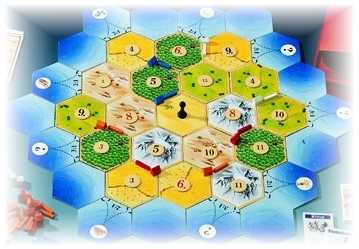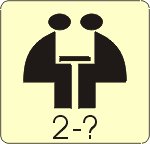People often ask about the games I play—what are they like? Why do I enjoy them? Aren't they all just like Monopoly? The difficulty in answering these questions is that there's a lack of a common language for us to communicate. Ideas and concepts that are second nature to me may be confusing to someone who hasn't played a game since childhood. Imagine trying to describe the qualities of a great film to someone who has never seen a movie. With this in mind, I find it useful to give a "crash course" in the qualities and properties of the games I play.
First, I try to emphasize that there are hundreds of different games available and this often elicits a reaction of disbelief—many people are only aware of games such as Chess, Checkers, Monopoly and Scrabble. If they've never been exposed to the "real world" of games, it's easy to think that that's all there is and everything else is a clone. Consider the dozens of trivia games: they have different topics, harder or simpler questions but they're mostly the same. Similarly with Monopoly you get themed variations such as Star Wars Monopoly or Simpson's Monopoly but they're really the same game. So when I tell people that there are hundreds of truly different games out there, they're somewhat skeptical.
At that point, I'll start explaining about the different aspects of games, hoping to impress upon my audience that the world of games is much greater than their current experience.
The Game Board
Often, I first talk about the game board because it's very visual and can be a good starting point to explain the different aspects of play. I present four basic types of board:
-
Symmetric: A symmetric board is one where most positions are about the same, and their effectiveness depends on the position of many pieces. Examples include Chess or Checkers.
-
Asymmetric: An asymmetric board is one where certain positions are more important than others. You try to capture those positions in order to gain better control over what is going on. A simple example is Monopoly: Boardwalk is generally a better property than Baltic Avenue. A more advanced example is from Risk: it is easier to keep control of Australia by placing forces in Indonesia so that province is more important than New Guinea or Western Australia.
-
 Random: Randomly generated maps change
from game to game. This is a bit harder to explain to people since
it is a relatively unfamiliar concept but showing them Settlers
of Catan makes things clear.
Random: Randomly generated maps change
from game to game. This is a bit harder to explain to people since
it is a relatively unfamiliar concept but showing them Settlers
of Catan makes things clear. -
Boardless: Some games do not have a board at all such as Coda or Res Publica. A variation of this is a board that is created as you play such as in Carcassonne.
Mechanics
Once the concept of different boards sinks in, I can move to the next level of difference and that is the "mechanics" of the game. There are many kinds of mechanics out there but I usually mention just these, which are simple to explain but still show great variety.
-
Roll and Move: This is the simplest mechanics I can start with. Every one knows Snakes and Ladders since many of us grew up on it. I also mention Monopoly as an example but many people do not agree that it is also a "roll and move" game. Yes, there is some trading, but nothing you can do about your movement.
-
Abstract Strategy: Although almost everyone knows Chess and Checkers, most of the people are not aware of this description for these games. I explain that most of these games are non-luck, and all information is available to the players. Many Checkers players are intrigued by the sudden knowledge that there are many other games of this type available.
-
Trading: Most people see Monopoly as a trading game. Each player tries to grab as many properties as possible with their available money. Once most properties are owned, trading begins. Monopoly players claim that trading is where good players are distinguished from the bad. Trading games can be much more interesting and I usually offer Traders of Genoa as an example.
For the following categories, I find it difficult to give examples based on popular games. The downside to this is that some people may start wondering, "What the hell is he talking about?" and if I think this is happening I skip the remaining categories. The upside is that by mentioning "exotic" games, some people are really intrigued and they become all the more curious.
-
Bidding/Auction: In different games players bid for different things. It can be bidding for actions, bidding for resources, even bidding for whom your enemy might be.
-
Simulation: The first thing that comes to mind is simulation of war. Although war games are a large segment of simulation games they are not the only ones—simulations can vary from economic to empire building.
-
Variable Player Power: Most people have the preconceived idea that all players have the same capabilities such as in Chess, Checkers, Backgammon and so forth. But this need not always be the case. War games are a good example where players start with different forces, different units and different reinforcements.
These six categories are not exhaustive but I think they're sufficient to show the wide variety that exists in the world of games.
This is already a fair amount of information for someone to absorb so I'll usually stop at this point—I can discuss different, more technical issues at a later time. This is also a good time to actually play a nice simple game.
After a few days or weeks my audience might like some more information on different aspects of gaming. So here are few more topics, which are a bit more technical but still interesting, and can show the huge variety in games.
Number of Players
 The number of players in a game may seem
insignificant but it has a huge impact on one very important point:
balance. It is easy to explain the idea to a non-gamer by looking at
Chess. Have them imagine a three player version and consider
what happens when two players decide to gang up on the third. Of
course this is not fair, but the question is: Is there a mechanic in
the game that can prevent this? A good multi-player game should be
able to address this point. My point is that a two-player game is
very different from a three or four player game.
The number of players in a game may seem
insignificant but it has a huge impact on one very important point:
balance. It is easy to explain the idea to a non-gamer by looking at
Chess. Have them imagine a three player version and consider
what happens when two players decide to gang up on the third. Of
course this is not fair, but the question is: Is there a mechanic in
the game that can prevent this? A good multi-player game should be
able to address this point. My point is that a two-player game is
very different from a three or four player game.
Number of Actions
The number of actions a player has in a turn can alter totally the structure of a game. Again, using Chess for example, imagine a variant where each player took three turns in a row. I do not believe that such a variant would remain as interesting the standard game. A single-action game is very different from a multi-action one.
Luck and Chaos
The inclusion of luck in games is a very personal matter—some like it, some don't. When I mention luck, someone usually jumps in to say that in a multi-player game with luck you can't plan ahead since so many things can change before your turn arrives. This is a good place to stop and explain the difference between two commonly confused concepts: luck and chaos. Luck could be described as a random factors such as the rolling of dice or the drawing of cards. Chaos on the other hand results from being unable to predict the actions of other players even when you have all information available to you. The more chaotic the game, the less sense there is in planning your turns. The two concepts are easily confused because luck-heavy and chaos-heavy games often have the same result: a random victor.
Order of Play
This includes two parts: Phases and changing order. Phases are a small modification on a familiar mechanic—instead of each player taking a complete, separate turn, all player perform one particular action (the phase) before proceeding to the next action (or phase). Another concept that non-gamers find surprising is changing the order of play between rounds. A simple idea, but a huge conceptual leap for some players.
Asymmetric Games
Asymmetric games tend to be less common but can be quite interesting due to the fact that players have different units/abilities/goals. Further, playing each side can provide a completely different experience. Sometimes it feels like owning multiple games instead of just one.
If I've gotten this far with my audience it's a pretty sure bet that they'll realize that board games are not a pastime suitable only for children. In fact, they might even ask me to recommend some games for them to try. A second benefit is that they might want to get together for a gaming night to these games first-hand and this is always a welcome occurrence.
- Gilad Yarnitzky


